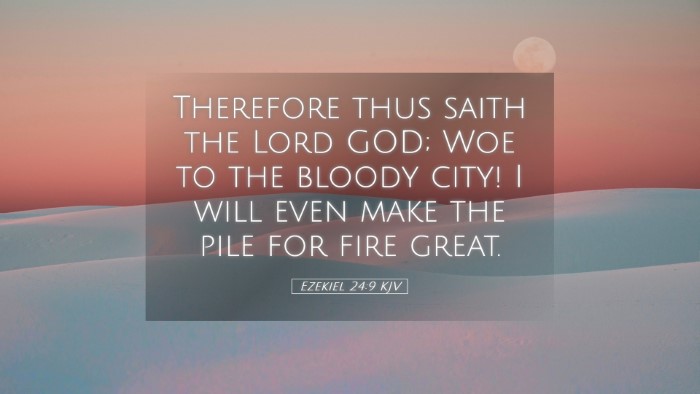Ezekiel 24:9 - A Commentary
Ezekiel 24:9 (ESV): “Therefore thus says the Lord God: Woe to the bloody city, to the pot whose rust is in it and whose rust has not gone out of it! Empty it piece by piece; let no portion fall on it.”
Contextual Background
The verse in question occurs during a significant period in the prophetic ministry of Ezekiel. The destruction of Jerusalem looms large in the text. Ezekiel’s prophecies serve both as a warning to Israel and as a broader commentary on sin and judgment. The city symbolizes rebellion against God, and the imagery of a pot in this verse is particularly striking.
Analysis of the Imagery
The metaphor of a “bloody city” reveals two layers of meaning:
-
Moral Corruption: The term “bloody” suggests widespread violence and injustice within the city. Commentators like Matthew Henry highlight that this reflects the moral decay of Jerusalem, which had turned from its covenant with God to commit acts of idolatry and violence against the innocent.
-
Divine Judgment: This characterization also indicates the impending judgment from God. As Albert Barnes notes, the violence and bloodshed caused by the inhabitants have brought about judgment, marking Jerusalem as a city deserving of destruction.
The Pot and Its Rust
The reference to a “pot” adds a striking visual aspect to the prophetic message. The pot symbolizes the city itself, with the “rust” representing the sinful accumulated guilt of its people.
Adam Clarke elaborates on this imagery, stating that the pot, despite its deterioration, is still capable of containing the "blood" of Jerusalem's violence. The “rust” indicating unpurified and defiled conduct that has not been cleansed or dealt with, further emphasizes God's displeasure. Clarke suggests that this rust signifies both the guilt that must be addressed and the need for purification.
Spiritual Implications
This verse prompts deep reflection on the consequences of sin and the nature of God’s judgment. As highlighted by Matthew Henry, it brings to light God’s expectation of holiness from His chosen people and the eventuality of judgment when they turn to wickedness.
-
The phrase “Empty it piece by piece” suggests a comprehensive judgment where God will remove every instance of sin meticulously, affirming His role as both judge and redeemer.
-
Warning for Modern Believers: The character of God as presented in this text serves as a warning for contemporary believers about the importance of maintaining a holy life. The ongoing presence of sin, akin to the rust within the pot, cannot be overlooked without consequence.
Conclusion
In Ezekiel 24:9, we see a vivid portrayal of divine judgment against a people who have turned away from their covenant with God. The combined insights from public domain commentaries deepen our understanding of the text, exposing both the gravity of sin and the necessity for purification.
For pastors, students, and theologians, this passage serves as a poignant reminder of God’s holiness and justice. It calls us to examine our own lives, the integrity of our communities, and our relationship with God. As we reflect on this verse, may we seek to cleanse our "pot" of all iniquities, knowing the importance of living lives that reflect God’s righteousness.


